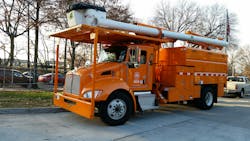New York City taking Clean Fleet plan to unprecedented levels
New York City, which operates one of the largest – if not the largest – municipal fleet in the nation, is on a mission to combat climate change. And it’s got an ambitious plan to do it.
Last month, Mayor Bill de Blasio announced the launch of NYC Clean Fleet, a plan to create the largest electric vehicle fleet of any U.S. city, cut municipal vehicle emissions in half by 2025 – 80% by 2035 – and serve as a model in fighting climate change.
“Mayor de Blasio has absolutely charged us with the most aggressive vision we’ve been asked to pursue,” Keith Kerman, deputy commissioner and chief fleet officer for the city’s Department of Citywide Administrative Services (DCAS), told Fleet Owner.
NYC Clean Fleet is the latest in a series of climate initiatives outlined in de Blasio’s OneNYC plan, with a long-term goal of reducing all greenhouse gas emissions across the city 80% by 2050. As part of the plan, Kerman said the municipal fleet, which now operates more than 300 full-use electric vehicles (EVs), will upgrade to more than 2,300 over the next decade.
New York City’s municipal fleet comprises more than 28,000 vehicles from various departments – police, fire, parks and rec, sanitation, DOT, DEP, and 50 smaller fleet agencies supported by DCAS.
“This will be an enormous expansion of full electric vehicles,” Kerman added, noting that the city began investing in alternative fuels and technologies 15 years ago. “We think that will make us the largest electric fleet in the country. We hope other entities will compete with us and move this along further.”
In addition to EVs, the city plans to expand the use of anti-idling, hybrid, and stop-start technologies in medium- and heavy-duty vehicles, such as sanitation trucks and ambulances, to substantially reduce emissions and gasoline use while at rest.
Currently, according to Kerman, the city operates more than 200 natural gas vehicles and has completely converted to biodiesel. NYC Clean Fleet aims to further increase the use of alternatives to traditional diesel fuels, including higher biodiesel blends, compressed natural gas, or renewable diesel, to displace the use of traditional diesel fuel in city vehicles by 2035. The city estimates that these alternatives will reduce emissions by 34%.
In an effort to work with the private sector, a Request for Information was released to more than 1,000 vendors last month, Kerman said. The RFI seeks additional technology solutions for both light- and heavy-duty vehicles, including advanced battery EVs, hydrogen fuel-cell vehicles, compressed natural gas vehicles, and other clean fuels.
“The purpose of the RFI is to really engage the private sector in partnering with us to attain these extraordinary goals,” Kerman said. “We procure vehicles and fuel from the private sector, so it’s critical that they’re partnering with us.”
Kerman mentioned that the city plans to spend $3.5 billion in the next 10 years on new fleet equipment and alternative fuels. He sees that as a smart investment.
Kerman said the city has already seen savings in fuel costs with the move to biodiesel. Plus, he added, maintenance costs for the city’s electric vehicles have been substantially lower than gas vehicles and there is less downtime for the electric fleet.
“We fundamentally believe sustainability will be cost effective,” Kerman said. “We believe that as you commit to making upfront investments there is financial return.”
When it comes to executing greener practices for smaller fleets that might just be getting started, Kerman suggests:
- Making upfront investments. “Strategically, if done well, this can be cost neutral or cost positive,” he said. “But it will involve upfront investments.”
- Starting small. Kerman advised that fleets interested in biodiesel could start small then move up to higher blends.
- Making the move to EVs. “We feel these technologies are mature and successful,” he said. “These technologies work. I think that for organizations that haven’t started, there’s a lot of opportunity to get started. Bring in a few vehicles consistent with your duty cycle and get in the game.”
DCAS has more on New York City’s fleet sustainability and the Clean Fleet initiative.
About the Author

Cristina Commendatore
Cristina Commendatore is a past FleetOwner editor-in-chief. She wrote for the publication from 2015 to 2023.
